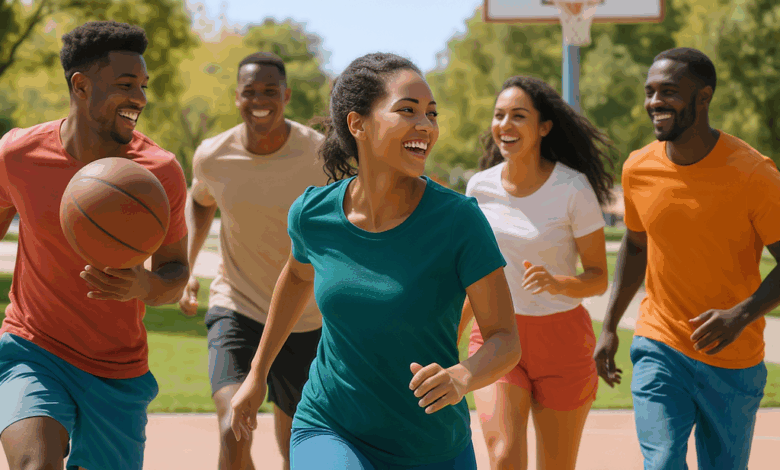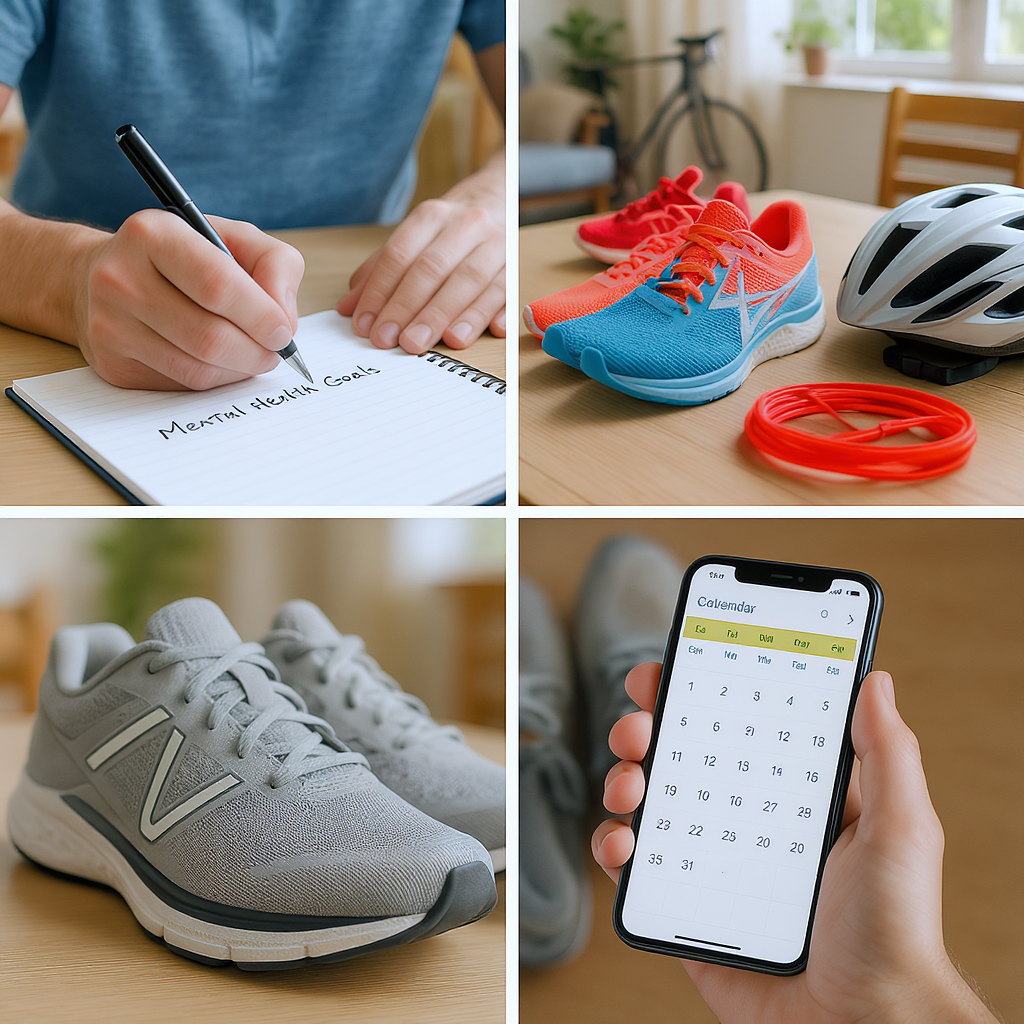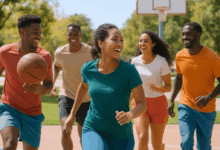Mental Health Benefits of Recreational Sports for Adults – A Step-by-Step Practical Guide

Preparing to Incorporate Recreational Sports for Mental Health Benefits
1. Understand Your Mental Health Goals
- Reflect on why you want to engage in recreational sports (stress reduction, social connection, self-esteem boost).
- Write down at least 2-3 personal mental health goals to stay motivated.
2. Check Your Physical Health and Readiness
- Consult a healthcare professional if you have existing health conditions or concerns.
- Ensure you have no contraindications for moderate physical activity.
3. Identify Enjoyable Recreational Sports Activities
- List sports or physical activities you find interesting (e.g., team sports like soccer, basketball; individual sports like swimming, cycling).
- Consider social aspects to boost mental health benefits.
4. Gather Necessary Equipment and Resources
- Basic sportswear appropriate for your chosen activity.
- Access to facilities or groups (local community centers, sports clubs, parks).
- A calendar or app to schedule activities.
Warning: Start with comfortable, well-fitting gear to avoid injuries and discomfort.
5. Set Realistic and Achievable Goals
- Plan for 45-minute sessions, 3-5 times weekly, based on research showing optimal mental health benefits.
- Start with shorter durations if new to exercise, gradually increasing time.
Implementing Recreational Sports to Enhance Mental Health
1. Begin with a Warm-Up Routine
- Spend 5-10 minutes on light cardio and stretching.
- This prepares your body and mind, reducing injury risk.
2. Engage in Your Chosen Recreational Sport
- Follow the rules and structure of the activity.
- Focus on enjoyment and social interaction rather than competition.
3. Monitor Your Physical and Emotional Response
- Notice changes in mood, stress levels, and energy after sessions.
- Keep a simple journal or app log to track progress.
4. Maintain Consistency and Build Habit
- Schedule sessions at regular times.
- Use reminders and buddy systems to increase accountability.
5. Use Social Interaction to Boost Benefits
- Join group activities or team sports to enhance social connections.
- Engage positively with teammates to foster a sense of belonging.
Warning: Avoid overexertion; if you feel pain or excessive fatigue, stop and rest.
6. Incorporate Physical Activity into Mental Health Practices
- Combine sports participation with therapy or counseling if applicable.
- Share your physical activity experiences with your mental health professional.
Verifying and Troubleshooting Your Recreational Sports Routine
1. Check for Positive Mental Health Changes
- After 4-6 weeks, assess improvements in mood, stress, and self-esteem.
- Use self-report measures or simple questionnaires if desired.
2. Identify and Address Barriers to Consistency
- Common issues: time constraints, lack of motivation, physical discomfort.
- Solutions: adjust schedule, find more enjoyable activities, consult a trainer or therapist.
3. Modify Activity Intensity and Duration as Needed
- If mental health improvements plateau, consider slightly increasing activity frequency or intensity.
- If overwhelmed, reduce intensity and focus on enjoyment.
4. Ensure Safety and Injury Prevention
- Watch for signs of injury (persistent pain, swelling).
- Seek medical advice promptly if injured.
5. Celebrate Achievements and Reassess Goals
- Recognize progress to boost self-esteem.
- Update goals to maintain motivation and challenge.
Warning: Do not ignore persistent negative feelings; if mental health worsens, consult a healthcare professional.
Checkpoint Summary
- Preparation ensures readiness and safety.
- Consistent, enjoyable participation maximizes mental health benefits.
- Regular verification and adjustment keep your routine effective and sustainable.
By following this comprehensive, step-by-step guide, adults can confidently use recreational sports to enhance their mental well-being, combining physical activity with social engagement and goal-setting for lasting benefits.
Integrating Mindfulness and Cognitive Techniques with Recreational Sports
Utilizing Mindfulness Practices During Physical Activity
- Develop awareness of bodily sensations and breathing patterns during sports to enhance mental presence.
- Implement breathing exercises and focused attention drills pre- and post-activity to deepen mind-body connection.
Cognitive Behavioral Strategies to Enhance Motivation and Resilience
- Use cognitive restructuring techniques to identify and reframe negative thought patterns related to exercise adherence.
- Employ goal visualization and positive self-talk to boost commitment and overcome motivational barriers.
Leveraging Biofeedback Tools for Mental and Physical Optimization
- Integrate wearable technology that tracks physiological markers (heart rate variability, stress levels) to adjust intensity and mental focus.
- Use data-driven feedback sessions to identify optimal mental states during sports participation.
Advanced Social Dynamics and Leadership in Team-Based Recreational Sports
Fostering Psychological Safety and Team Cohesion
- Apply techniques from organizational psychology to create inclusive, supportive team environments that enhance mental health benefits.
- Facilitate open communication channels and conflict resolution strategies tailored to recreational contexts.
Leadership Skill Development Through Sport Facilitation
- Train in peer leadership and mentorship roles to promote social connectedness and personal growth.
- Design and lead group activities that emphasize cooperative skills and emotional intelligence.
Structured Social Support Systems and Accountability Mechanisms
- Implement buddy systems and accountability partnerships using digital platforms for scheduling and motivational support.
- Organize periodic group reflections and mental health check-ins to strengthen community bonds.
Data-Driven Personalization and Optimization of Recreational Sport Regimens
Utilizing Advanced Monitoring and Analytics for Tailored Programming
- Employ comprehensive tracking of psychological and physiological responses to customize intensity, duration, and type of sports activities.
- Analyze trends over time to fine-tune routines for maximizing mental health outcomes.
Implementing Periodization and Recovery Protocols
- Adopt periodized training cycles that balance load and recovery to prevent burnout and enhance psychological resilience.
- Incorporate evidence-based recovery techniques such as active rest, mental relaxation, and nutrition strategies.
Automation of Routine Management and Progress Tracking
- Use automated scheduling and reminder systems integrated with wearable devices and mental health apps to maintain consistency.
- Set up alert mechanisms to flag deviations in mental health indicators or physical readiness, prompting timely adjustments.
Warning: Advanced data collection and analysis require careful handling of personal health information to ensure privacy and compliance with ethical standards.
These advanced methodologies empower adults to move beyond basic participation, enabling mastery in leveraging recreational sports as a sophisticated tool for mental health optimization, social development, and personalized well-being strategies.

Celebrating Your Achievement and Verifying Mastery
Recognizing Your Progress
Congratulations on completing this comprehensive guide on leveraging recreational sports for mental health benefits! You’ve taken meaningful steps to enhance your well-being through physical activity, social engagement, and mindful goal-setting. This accomplishment reflects your commitment to personal growth and mental wellness.
Skill Verification Checklist
- You have identified and clarified your mental health goals related to recreational sports.
- You understand how to prepare safely, including physical readiness and equipment needs.
- You can implement a consistent, enjoyable sports routine that integrates social interaction.
- You know how to monitor your emotional and physical responses and adjust your activities accordingly.
- You are familiar with advanced strategies such as mindfulness integration and data-driven personalization.
- You recognize when to seek professional help and how to maintain safety.
Use this checklist to confirm your mastery and confidence in applying these techniques.
Continued Learning and Skill Development Pathways
Expanding Your Knowledge and Abilities
- Explore mindfulness and cognitive behavioral techniques further to deepen your mental health benefits.
- Engage with leadership and team-building opportunities in recreational sports to enhance social skills.
- Experiment with wearable technology and data analytics to personalize and optimize your routine.
- Consider integrating your sports activities with professional mental health support for a holistic approach.
Practical Next Steps
- Join local or online communities focused on recreational sports and mental wellness.
- Attend workshops or webinars on sports psychology and mental health.
- Keep a reflective journal to track long-term progress and insights.
Remember, continuous skill development turns your newfound knowledge into lifelong resilience and well-being.
Troubleshooting Resources and Ongoing Support
Reliable Support Channels
- Consult healthcare professionals or certified trainers when facing physical or mental challenges.
- Access mental health resources such as counseling services or peer support groups.
- Utilize reputable online platforms and forums dedicated to recreational sports and mental health.
Community and Expert Connections
- Engage with social groups or clubs that share your interests to maintain motivation and accountability.
- Follow thought leaders and experts in sports psychology and wellness for updated insights.
- Participate in group check-ins or buddy systems to foster encouragement and shared learning.
Staying Informed and Prepared
- Subscribe to newsletters or alerts from trusted wellness organizations.
- Keep abreast of new research and advancements in recreational sports for mental health.
- Prioritize privacy and ethical considerations when using advanced monitoring tools.
Keep in mind: Ongoing support and adaptive learning are key to sustained mental health benefits and personal growth.
You are now equipped with a solid foundation and actionable strategies to confidently enhance your mental health through recreational sports. Embrace this journey with enthusiasm, knowing that continued learning and community support will empower your success every step of the way.
